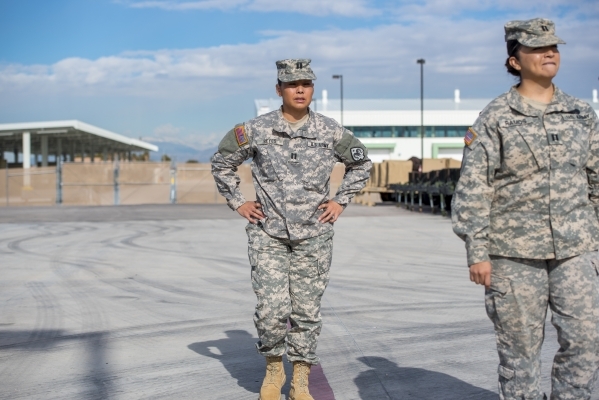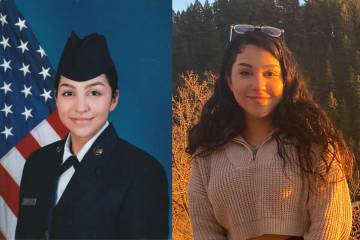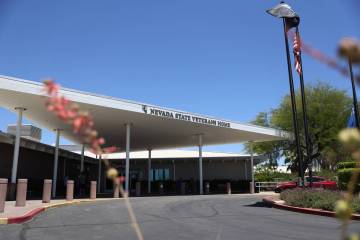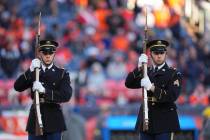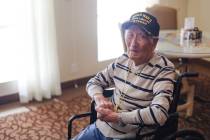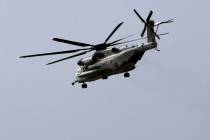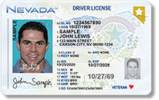Possibility of women being required to register for Selective Service ignites debate
The other boot is ready to drop in the push for women to have equal footing with men in the military.
With all job opportunities set to open this year for women in the all-volunteer armed forces — including battlefield combat specialties — the prospect for requiring women 18 through 25 years old to register for the draft is destined to become a reality should the Department of Defense persuade Congress to change the Military Selective Service Act.
Registering for the draft doesn't necessarily mean someone will be drafted, like the last time it was used four decades ago during the Vietnam War era. Federal law requires, however, that draft-age men register with their appropriate draft board after their 18th birthday. There are 1,940 Selective Service boards, including 12 in Nevada, representing some 3,300 counties in the United States.
Secretary of the Army John McHugh remarked in October that if the goal "is true and pure equality, then you have to look at all aspects," including a requirement for women to register for the draft like men of the same age have done for decades.
Two months later, the White House echoed McHugh's prediction that the women-draft issue will have to be considered.
In the wake of Defense Secretary Ashton Carter's Dec. 3 announcement that even the most dangerous combat roles will be open to women, spokesman Josh Earnest said the following day that the White House will work with Congress to find out if changes to the draft law are needed because of Carter's decision.
Sparking a national debate
From women in uniform at National Guard armories to female tourists on the Strip, lines are already being drawn in Las Vegas for discussion of a Selective Service requirement.
"We want equal rights, so the rights need to be standardized or else it's never going to be equal," said Capt. Denisse Ramos, 32, a Nevada Army National Guard soldier, who has deployed twice to Iraq and once to Afghanistan and knows firsthand what it's like to be targeted by enemy combatants.
Ramos's parents had to sign for her when she was 17 before she could join Nevada National Guard's 72nd Military Police Company. "My parents were against it 100 percent," she said. "It took a couple months to convince them that I was going to join at 18 if they didn't sign."
As a 19-year-old specialist, and one of 14 women deployed in 2003 with the Abu Ghraib prison security detail in Iraq, she saw some of her "buddies" get hurt by a roadside bomb attack and routinely endured rocket fire in the compound.
"On my way back I was determined to get out of the military," said Ramos, a single woman with no children. She later followed the advice of a lieutenant colonel and became an officer, currently serving with 17th Sustainment Brigade at the Las Vegas Readiness Center.
"I don't see how the whole registering-for-the-draft is a big deal now," Ramos said, adding that "people have a misconception of what a draft will be."
"Women have been going to combat for years now. ... It should be a requirement because the time when the draft comes, there's a policy in place where if you're not qualified, you're not going to be deployed," she said.
Likewise, Capt. Liberty Reyes supports a draft-registration requirement. An officer in the 17th Sustainment Brigade and a Shoshone-Bannock tribe member, she was influenced about the military growing up at Idaho's Fort Hall Indian Reservation, where her uncles, cousins and mother hailed from the prior-service ranks.
"We take pride in our military service members and honor the service that they've given and the pride they've taken in protecting our land," she said. "I think that equal opportunities that women have gained over the last 15 to 20 years has opened a lot of doors but also has increased the responsibility that women must have in this world."
Reyes, 36, said she discussed the impact of draft registration with her twin 11-year-old daughters.
"Their first reaction was, 'Oh. We would be forced rather than have a choice?' But they understand the responsibilities of the rights that we have and our duty to fulfill them if the country needs it," she said.
Equality for women in military occupations and leadership opportunities should also translate to meeting the same Selective Service standards as men, Reyes said. "So saying that is not just because I'm in the military, or because I'm outside of the range of age requirements, but it's also because I believe that anyone who is physically able should serve when called upon."
Six women interviewed on the Strip Jan. 8 said they admire women who serve but don't think they should be required to register for the draft.
"I would not do it. It's way too scary," said Lauren Zentz, 21, of Detroit, who was born on an Army post, Fort Riley, Kansas, where her dad served.
Jennifer Chilewski, 44, of Arcadia, Nebraska, said she is "old-fashioned" and believes women "need to be with their families" but thinks it's great for women to serve in the military if they prefer that over being homemakers.
Buffy Luehm, 44, also of Arcadia, said if there had been such a requirement when she was "in high school I would have signed up for the draft." She said she doesn't think draft registration should be required of women. "I think it should be an option."
Jessica Ojeda, 43, of Las Vegas, said, "If you're going to draft men and women, who's going to be home raising the kids?"
Sabella Acuna, 23, of Las Vegas, said she doesn't believe draft registration for women "would be a good idea. Women's roles are normally homemakers. The home is a building block of society."
Felicia Sipe, 37, of Las Vegas, said she'd "probably shoot myself in the foot" to avoid the draft. "I love my country," she said, adding that she couldn't imagine being killed in combat, however, or being faced with the decision of having to take someone else's life.
"I don't have it in me," Sipe said.
A history lesson
Aside from about 650 men who were inducted in 1973, the last major U.S. military draft lottery was held 44 years ago, in 1972, when more than 49,500 young men were drafted as the Vietnam War was winding down.
American men were drafted every year from 1917 through 1973, except 1947. During that time more than 16 million men were inducted, with the last entering the Army on June 30, 1973. Post-Vietnam, no Selective Service registration was required from 1975 until 1980, when President Jimmy Carter reinstated peacetime registration for men in response to the Soviet Union's invasion of Afghanistan.
"He wanted females to register also," said Selective Service System spokesman Richard Flahavan. "It went to Congress and the House voted on it and it was overwhelmingly defeated. In the Senate it died in committee."
The Supreme Court also took a stand on two issues. First, the Constitution stipulates that Congress has authority over military matters when it comes to augmenting force levels through conscription. Second, since women were precluded from combat at the time and the draft was geared toward combat replacements, there would be no reason to force them into registration.
Flahavan said trying to couch draft registration as a civil rights issue is akin to having a driver's license: it's a privilege not a right.
With all military occupations open to women, the question of requiring women to register for the draft is "going to drag on for a bit. ... There's no big hurry really," he said. "Nobody knows how that's going to turn out. It's whatever Congress and the White House decides."
Women make up roughly 15 percent of the all-volunteer military. Without women in the armed forces "the country would really be in trouble manning the units to do anything," he noted.
Although rarely enforced, the draft law's clout for enforcement for registration lies is a $250,000 fine and five-year possible prison sentence. Young men who fail to register are also precluded from government loans for college, for example, and can't be hired for government jobs.
What about the future?
Nevada's Selective Service Director Frank Gonzales said adding women to the draft registration system wouldn't be that difficult. "We'll just fold it into the system we have running. I don't see that as a major issue."
He said the "bigger question is, 'What is the future of the Selective Service System in the United States,' and I think this is going to trigger that discussion.
"This is going to raise some interesting conversations from the congressional level. We went through 15 years of war right now, and we haven't had to use a draft because of the volunteer forces. ... I think it's going to be a question of relevance of the Selective Service System."
In December, Rep. Charles Rangel, D-N.Y., who proposed legislation on the issue, offered his insights: "We need to reinstate the military draft requiring both men and women to register for Selective Service — so as to compel the American public to question why and how we go to war, and think twice about sending brothers and sisters, sons and daughters into harm's way."
— Contact Keith Rogers at krogers@reviewjournal.com or 702-383-0308. Find him on Twitter: @KeithRogers2.
DRAFTEE NUMBERS BY WAR ERAS
World War I (1917 to 1918): 2,810,296
World War II (1940 to 1946): 10,110,104
Korean War (1950 to 1953): 1,529,539
Vietnam War (1964 to 1972): 1,857,304
Source: Selective Service System
HOW TO REGISTER
Young men can register for the draft when they renew or obtain a Nevada driver’s license; or at any post office; or by accessing the Selective Service System online.
— High schools also provide male students with registration information.









